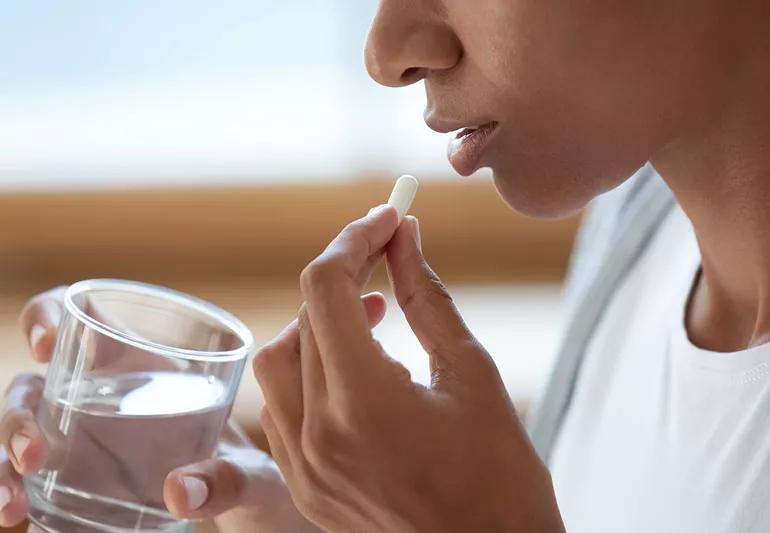An expert discusses what effects, if any, vitamins have on your ability to sleep

Image content: This image is available to view online.
View image online (https://assets.clevelandclinic.org/transform/45187866-037f-4e47-9956-541fe7ae6561/wmnTakingPill-1257791113-770x553-1_jpg)
woman taking vitamin
You know the feeling: You toss and turn, night after night and nothing seems to quite do the trick. You’ve tried over-the-counter sleep aids and even some supplements, but you’re beginning to wonder if there’s a more natural way to get some extra zzz’s.
Advertisement
Cleveland Clinic is a non-profit academic medical center. Advertising on our site helps support our mission. We do not endorse non-Cleveland Clinic products or services. Policy
One avenue some people explore involves vitamins and supplements. We get them via food and drinks and many of us take over-the-counter vitamins and supplements. Is there a certain vitamin or combination of supplements that could help induce sleep so we don’t have to rely on prescription medications?
We spoke with integrative medicine specialist Naoki Umeda, MD, to find out more about what we do and don’t know about vitamins and supplements for sleep and whether certain products can offer hope – or do more harm.
According to Dr. Umeda, “While some natural remedies such as melatonin, valerian, magnesium or chamomile tea may help for some people, there’s no definitive evidence from randomized controlled trials these are effective for typical insomnia,” he says.
There are, though, some supplements that may help, but you should consult your healthcare provider for more information.
Advertisement
Again, although these may be helpful, there are only a handful of well-designed studies with inconclusive results. More research is definitely needed.
Another area where there has been preliminary research is on how certain vitamins – or lack thereof – could adversely affect your sleep.
A 2018 study showed a potential link between vitamin D deficiency and sleep disorders. Given other data available about the effects of vitamin D deficiency, this connection doesn’t seem that surprising. But even the researchers behind the study admitted the conclusions were “controversial” and said more studies are needed to confirm the link. “That connection might be correct, but it could be just one of several factors,” says Dr. Umeda.
It’s possible that other vitamin deficiencies could indirectly lead to poor sleep. For instance, iron deficiency is considered a potential cause of restless legs syndrome which can interrupt sleep. But, as with the other studies mentioned here, there’s just not enough evidence.
Whatever you may hear or read, there’s just not enough evidence to back any strong connection between vitamins, supplements, and sleep. Melatonin, valerian, magnesium, or chamomile tea may be helpful and are usually safe but they might not work for everyone.
If you can, suggests Dr. Umeda, do your best to get most of your vitamins from a healthy, balanced diet rather than supplements. “Overdoing vitamins or taking a combination of various vitamins may affect sleep,” he says.
“If your diet is healthy, though, your body will absorb an adequate amount of most vitamins. In addition, simple lifestyle changes can improve your sleep. Meditation, deep breathing, or aromatherapy and essential oils may help,” he adds. “It is also recommended to limit caffeine, create a dark, quiet and cool sleeping environment and not use smartphones, tablets or laptop computers for at least one hour before going to sleep.”
Check with your healthcare provider to see if taking a multivitamin or a daily dose of a specific vitamin is necessary for you, particularly if you may need several different vitamins. And, Dr. Umeda notes, be sure to check with your healthcare provider if you want to take or are taking certain vitamins or supplements for your sleep issues.
Advertisement

Sign up for our Health Essentials emails for expert guidance on nutrition, fitness, sleep, skin care and more.
Learn more about our editorial process.
Advertisement
Sleep masks can help you create total darkness so you can sleep better
To avoid sleep deprivation and shift work sleep disorder, try adopting habits that minimize light exposure and prioritize daytime sleep
Sleep disorders, mental health conditions and other health concerns can all affect the quality of your sleep
Most people fall asleep within 10 to 20 minutes, but if your experience is different, adjusting your sleep schedule may help
Stick to a consistent schedule, be mindful of screen time and work on reducing your stress levels before bed
Napping can boost focus, memory and mood — if you time it right
These devices can help shed light on what’s happening with your body during rest
Keep a dream journal, set your intentions before bed and make sure you’re getting a full night of high-quality sleep
Prioritize your health by managing stress, strengthening your social connections and getting quality sleep
Bolsters, blankets, pillows and blocks can offer extra support, stability and comfort
Allergies, postnasal drip, asthma or reflux could be to blame for a cough that won’t quit